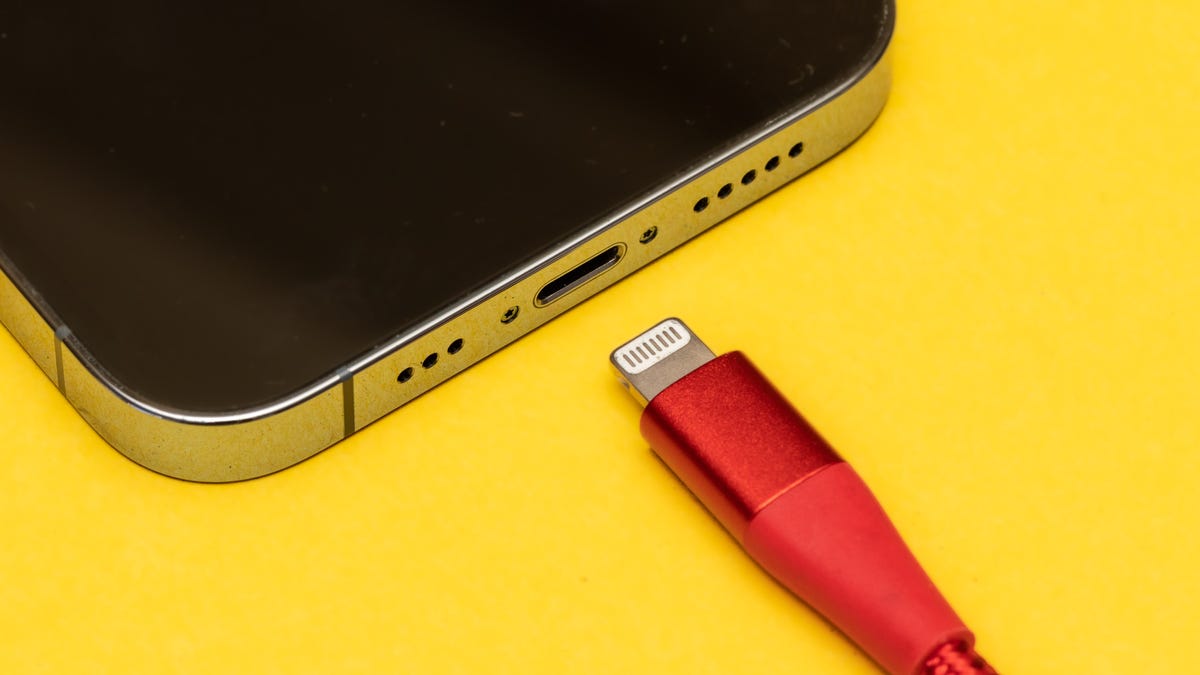Finally, a USB-C iPhone Is Coming
The company will comply with the European Union's new rule for universal USB-C battery charging, likely ditching its decade-old Lightning cable.

The next iPhone will likely have a new plug.
Apple will change the way we charge the batteries for our iPhones, to comply with new European Union rules that require every new smartphone to work with a common USB-C cable by 2024, a company executive said Tuesday. Though he didn't offer details, he suggested Apple's existing Lightning cable may go away as a result.
Two top-level Apple executives suggested they aren't particularly happy about the new rules, when discussing them onstage Tuesday at The Wall Street Journal's WSJ Tech Live Conference in Laguna Beach, California. Originally, Apple believed it had come to a compromise with EU regulators by offering a cord in the box with its iPhones that plugged into USB-C on one end and its proprietary Lightning cable on the other.
"We have no choice -- as we do around the world, [Apple will] comply with local laws," said Greg Joswiak, Apple's senior vice president of worldwide marketing. "We think it would have been better environmentally and better for our customers to not have a government be that prescriptive."
Apple's been steadily adding USB-C ports to its Mac computers and iPad tablets. It's also been rumored to be working on iPhones with USB-C ports for a while now, so it's not a terribly surprising admission.
Still, the move is a rare public acknowledgement from the world's highest valued company about the future of its products, and in particular how new government rules are shaping its business. Though selling Lightning cables at $19 apiece isn't what's made Apple its billions in profits, the proprietary nature of its technology did help it create a branded ecosystem of accessories built specifically for its devices.
Over the past two decades, Apple's licensed its 30-pin connector for the iPod, then Lightning connector for the iPhone and iPad, to accessories makers to create speakers, camera add-ons and all sorts of other items.
"It's been a great connector and over a billion people have it already," Joswiak said. When asked how Apple will integrate USB-C into the iPhone, he declined to discuss specifics. "The Europeans are the ones dictating timing for European customers."
While on stage, Joswiak and his colleague Craig Federighi, Apple's senior vice president of software engineering, answered other questions about the company's business. They dismissed bringing iMessage to devices powered by Google's Android software, saying the company wouldn't be able to invest as heavily in an Android version and thus would hold back innovation.
The pair coyly responded to questions about future products, such as whether there will ever be a Mac computer with a touchscreen. "Who's to say?" Federighi replied.
He did speak more forcefully about bringing employees back to the office, an issue that's raised unusual public controversy between the company and its staff. When Apple began talking about plans to return to the office last year, a group of employees pushed back saying they were worried about health and safety issues, particularly for those for whom exposure to the COVID-19 virus could cause harm to them or a family member.
"Our whole culture has been about being in the same place together, building products in tight interdisciplinary teams, and that's who we are," Federighi said, adding that the petitions publicly posted online come from "I don't know, a 10th of a percent of Apple employees."
"Of course, there's some people who moved to Kansas and said, 'This is where I want to be,'" he added. "Is that Apple employees? It's an Apple employee. But I think a lot of us are thrilled to be able to engage with one another. And I think it's important."



